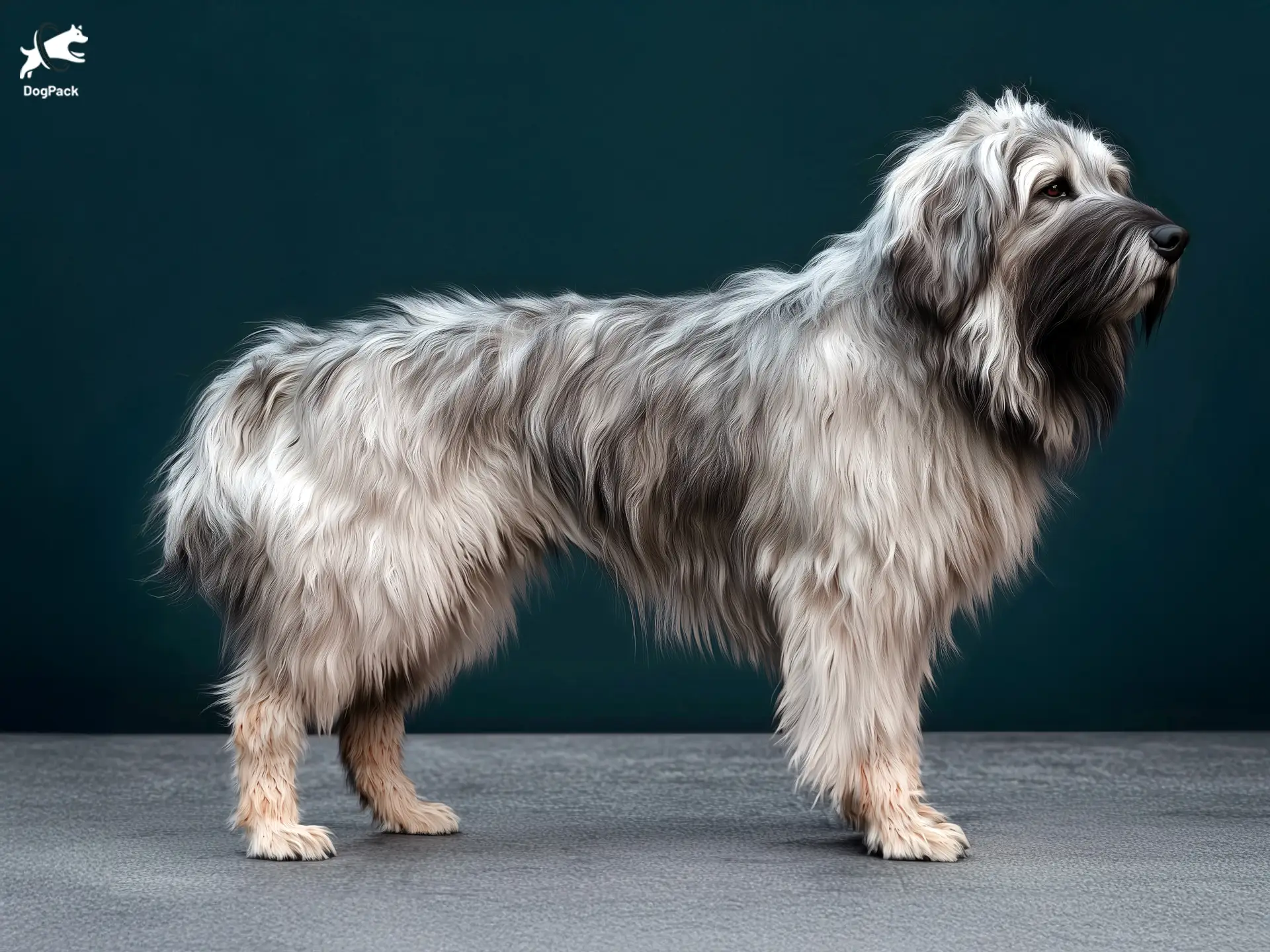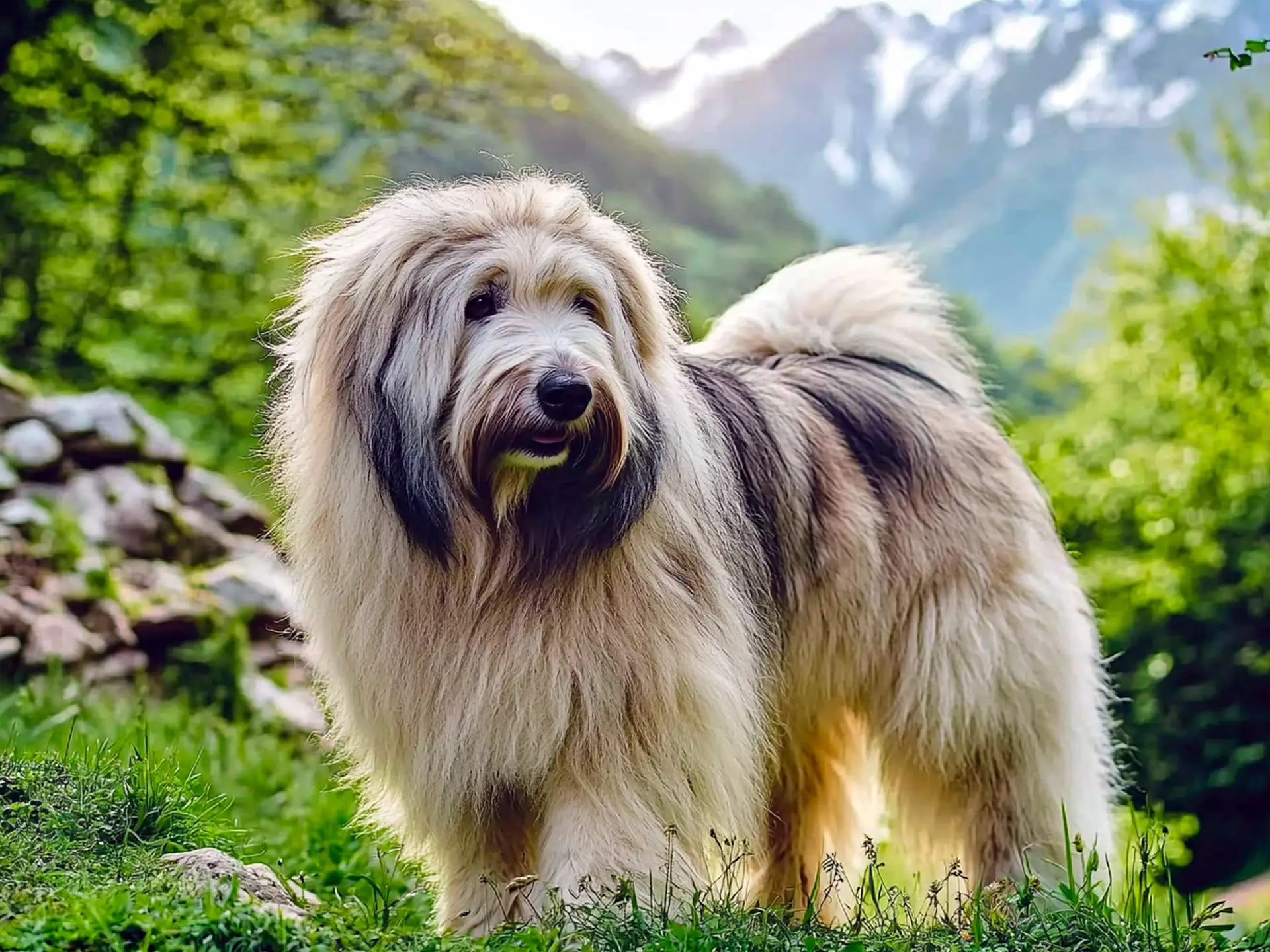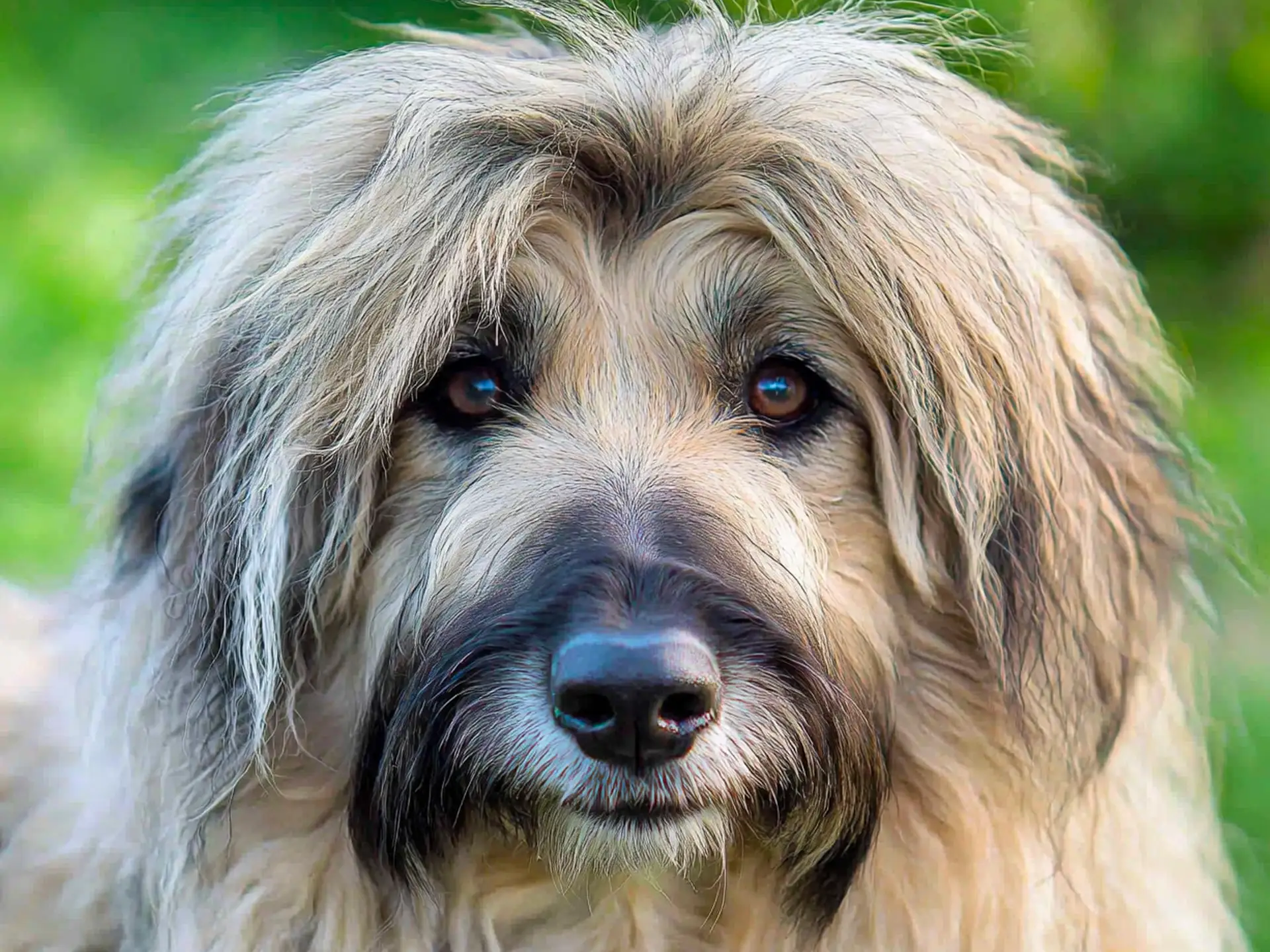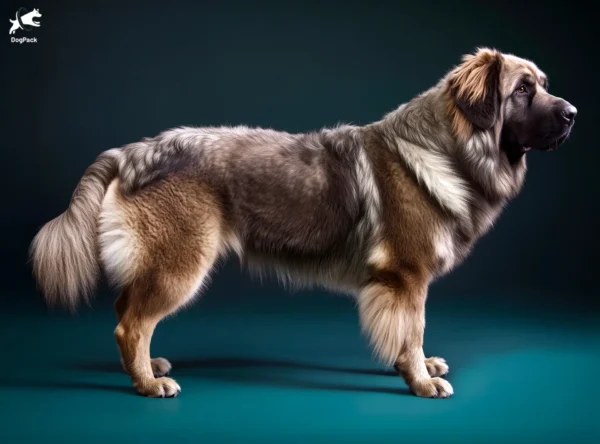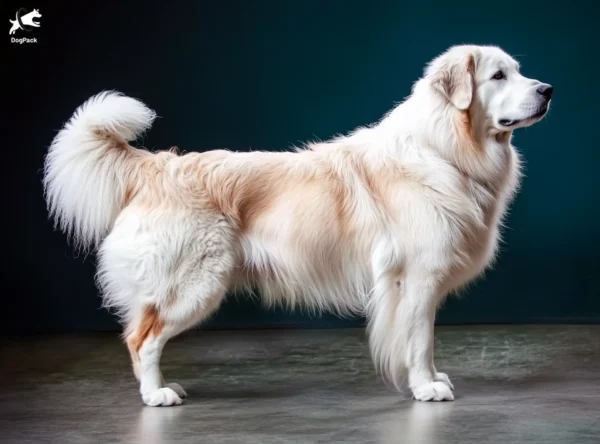Romanian Mioritic Shepherd Dog Breed Info & Overview
The Romanian Mioritic Shepherd, hailing from Romania’s picturesque Carpathian Mountains, is a majestic working dog with a rich heritage. Known for its protective instincts, dense, lush coat, and calm demeanor, this rare breed excels as a guardian and loyal family companion. With courage, devotion, and a strong sense of purpose, the Mioritic Shepherd brings both strength and heart to any household.
Characteristics
Pictures
Breed History
The Romanian Mioritic Shepherd traces its roots deep into Romania’s pastoral traditions, where it safeguarded flocks against wolves and bears. Over centuries, selective breeding shaped a resilient, courageous guardian that could withstand harsh mountain climates. Not just a farm worker, it symbolized the rugged heritage of the Carpathian region.
As the breed evolved, it maintained a strong bond with shepherds who depended on its instincts. The dogs were known for their unwavering loyalty and calm temperament, traits that earned them reverence in Romanian folklore. Gradually, the breed’s reputation expanded beyond the countryside, captivating enthusiasts seeking a reliable protector.
In modern times, official recognition by canine organizations and breed clubs helped preserve its authenticity. Although still considered rare outside Eastern Europe, the Romanian Mioritic Shepherd’s story continues to unfold. By blending history, tradition, and adaptability, this large guardian stands as a living piece of Romania’s cultural tapestry, ready to be appreciated worldwide.
Temperament, Personality
Intelligent and even-tempered, this breed is surprisingly gentle despite its imposing size. The Romanian Mioritic Shepherd forms strong connections with family members, responding warmly to a caring environment. Early socialization ensures it adapts well to children and respects household boundaries, forging a bond that stands firm like an old family friend.
Though naturally protective, it rarely acts aggressively without cause. With proper training, it remains watchful yet calm around strangers, reserving its formidable presence for real threats. As it matures, a balanced temperament emerges—confident and self-assured, never timid or jittery, yet not needlessly confrontational.
When living with other pets, thoughtful introductions matter. Consistent, positive reinforcement builds trust, encouraging the breed to accept new animal friends. This harmony doesn’t come overnight, but patience pays off. The Romanian Mioritic Shepherd thrives in an environment where mutual respect and understanding create a peaceful and secure family dynamic.
Physical Characteristics
Robust and well-built, this breed stands tall, projecting an aura of strength and stability. A thick, weather-resistant double coat forms a hallmark of its appearance, composed of rough, shaggy hair that shields against harsh elements. Beneath that coat lies a muscular frame with sturdy bones, built for endurance rather than speed.
Its head is broad, with gently rounded skull and expressive, dark eyes that convey intelligence and calm reserve. Long drop ears rest close to the cheeks, and a powerful neck supports a strong, slightly rectangular body. The entire silhouette suggests a guardian, not merely by role but by design.
The tail is bushy, typically carried low at rest, and raised when alert. The breed’s coloration often includes white or pale shades with gray or cream patches. Every detail—the coat’s texture, the confident posture, and the strong limbs—reflects the Romanian Mioritic Shepherd’s legacy as a rugged, dependable working companion.
Health Issues
While generally robust, the Romanian Mioritic Shepherd can face a few health issues. Hip dysplasia is one concern, where improper joint formation may impact mobility. Regular check-ups and appropriate exercises help maintain joint health. Working closely with a trusted vet ensures potential problems are caught early.
Eye conditions, like progressive retinal atrophy, are also possible. Though not common, responsible breeders screen their breeding stock to reduce genetic risks. Early diagnosis and timely intervention increase the dog’s comfort, preserving its quality of life. Routine eye examinations are a proactive measure to keep vision issues at bay.
Preventive care, including balanced nutrition and a well-planned exercise regimen, supports longevity. Maintaining a healthy weight alleviates stress on joints, while annual veterinary assessments can detect subtle health changes. With mindful attention, Romanian Mioritic Shepherd owners can foster a vibrant, active life for their cherished companion, well into its senior years.
Grooming Needs
Caring for this magnificent coat is no small task. The breed’s thick, coarse hair requires weekly brushing to remove debris and prevent matting. Incorporating a sturdy pin brush and comb ensures the undercoat stays tangle-free. Occasional trimming around the paws and sanitary areas keeps the Romanian Mioritic Shepherd neat.
A full bath isn’t necessary too often—every few months is sufficient unless the dog indulges in mud play. Use mild, dog-specific shampoos to preserve natural oils and maintain a healthy coat and skin. Regular checks for ticks and burrs, especially after outdoor adventures, prevent discomfort and keep the coat pristine.
Don’t forget dental hygiene and nail care. Brushing teeth a few times a week and trimming nails monthly ensures overall well-being. Adopting a consistent grooming routine early on helps the dog relax during sessions. The reward? A well-groomed Romanian Mioritic Shepherd radiating health and comfort inside and out.
Exercise Requirements
Though not a hyperactive whirlwind, this breed thrives with moderate but consistent exercise. Two long walks a day or a couple of energetic play sessions suffice. A fenced yard offers room to roam and patrol. Mental stimulation, like puzzle toys or scent-based games, engages its keen mind, preventing boredom.
Without enough activity, the Romanian Mioritic Shepherd might become restless, seeking out mischief—like rearranging your garden or investigating the kitchen cabinets. Balancing structured routines with free exploration keeps it content. Short hikes, especially in cooler climates, let it revisit its mountain heritage and revel in the outdoors.
This breed appreciates having a job, even if it’s as simple as carrying a backpack during walks. Engaging activities, like practicing obedience commands outdoors, enhance the bond between owner and dog. Overall, consistent, moderate exercise ensures a well-adjusted companion ready to stand guard or lounge happily beside its family.
Training Tips
Training should start young, blending firmness with gentleness. The Romanian Mioritic Shepherd learns best through calm, consistent methods and positive reinforcement. Treats, praise, and patience outweigh harsh corrections. This approach nurtures respect, encouraging the dog to follow your lead rather than challenge it.
Address independence by establishing basic commands early. Sit, stay, and recall are vital for managing a large, protective dog. Gradually introduce distractions—visitors, other pets—to strengthen obedience under varying circumstances. Regular short sessions prevent mental fatigue and keep learning fun, fostering cooperation rather than stubborn resistance.
Socialization is equally important. Introduce new environments, sounds, and people in a controlled manner. This careful exposure molds a dog that’s confident and secure. With time and effort, the Romanian Mioritic Shepherd becomes a trustworthy guardian who follows commands willingly, making life smoother for everyone involved.
Nutrition, Diet
Due to its large size and working heritage, the Romanian Mioritic Shepherd thrives on a high-quality, protein-rich diet that supports muscle development and sustained energy. Offer around 4 to 5 cups of premium, large-breed kibble daily, split into two meals. Select a formula containing moderate fat and joint-supporting supplements like glucosamine.
In its homeland, these dogs often enjoyed hearty meals with lean meats and occasional organ meat sources. Consider incorporating boiled poultry or fish, cooked carrots, and a dash of cod liver oil for coat health. Always measure portions precisely, ensuring the dog remains lean and agile rather than overweight.
Adapting the diet as it ages is critical. Younger dogs need higher protein for growth, while adults benefit from balanced formulations that maintain ideal body condition. Adjust quantities based on activity levels and consult a veterinarian experienced with this breed’s nutritional needs before making significant dietary changes.
Adoption, Breeders
When seeking a Romanian Mioritic Shepherd, approach breeders who value health tests, lineage verification, and proper puppy socialization. Expect to wait; this breed remains rare. Engaging with Romanian breed clubs or national kennel organizations helps locate dedicated experts passionate about preserving authenticity.
Rescue groups occasionally have adult dogs in need of loving homes. Patience and thorough research ensure you find a reputable source. For international insight, the Romanian Shepherd Dog Group offer information on this breed and could guide you toward ethical acquisition methods.
Before committing, verify breeder credentials, examine living conditions, and meet the puppy’s parents. A respectful, well-informed approach leads you to a loyal companion that meets both your expectations and the breed’s proud heritage, ensuring a fulfilling relationship from day one.
Family Pet?
For families able to provide space and guidance, the Romanian Mioritic Shepherd proves a stalwart ally. Protective but affectionate, it watches over children with a gentle eye. Though best suited to homes with older kids, it responds well if younger ones are taught respect, reinforcing a safe and nurturing environment.
Introductions to family pets should be gradual, pairing patience with positive associations. The dog’s calm demeanor often allows peaceful coexistence—especially when everyone understands boundaries. With time, it bonds closely, considering family members its flock, deserving of unwavering loyalty and vigilant watchfulness.
Consistent interaction cements these bonds. Daily play sessions or evening cuddles show the dog it belongs. Under firm yet loving guidance, it becomes a beloved protector that fits seamlessly into family routines, providing comfort, companionship, and a tangible sense of security.
Right For You?
Before welcoming this breed, reflect on lifestyle and environment. Ample space, a securely fenced yard, and patience for grooming are vital. If you prefer a low-maintenance, couch-loving companion, consider a different dog. The Romanian Mioritic Shepherd thrives with owners who appreciate its working roots and can handle its protective instincts.
This is not the breed for novices or those in tight apartments. Yet, if you want a steadfast guardian and are prepared to invest time and energy, this dog’s loyalty shines. It excels under an owner who values training, outdoor activities, and a dedicated grooming routine.
Time, consistency, and firm guidance transform it into a cherished family member. By carefully assessing your home dynamics and ambitions, you’ll determine if the Romanian Mioritic Shepherd’s unique blend of power and gentleness aligns with your vision of the ideal canine companion.
Conclusion
Choosing the Romanian Mioritic Shepherd means embracing a breed of rare heritage, deep loyalty, and formidable presence. It’s not for everyone, but those who commit to its needs—regular exercise, ample grooming, patient training—reap the rewards of a faithful, watchful protector. This dog bonds intensely with its family, respecting its role as both guardian and companion. If you have the space, determination, and appreciation for a rugged yet warm-hearted character, this remarkable shepherd could be your perfect match.
FAQs
-
How does a Romanian Mioritic Shepherd handle travel?
A Romanian Mioritic Shepherd often adapts to road trips if introduced gradually. Start with short drives, ensure proper restraints, and provide comfort items. Over time, it’ll relax and enjoy journeys, especially if familiar scents and routines are maintained. Patience helps it adjust confidently.
-
Is the Romanian Mioritic Shepherd known for a particular vocalization style?
The Romanian Mioritic Shepherd uses a deep, resonant bark, reserved mostly for alerts. It’s not a chronic barker, but when danger looms, expect a booming warning. Maintaining proper training helps channel this vocal skill into a reliable alarm system rather than nuisance noise.
-
Does the Romanian Mioritic Shepherd bond closely with one family member?
While loyal to the entire household, the Romanian Mioritic Shepherd may favor the person who consistently handles training and daily care. Regular interaction, grooming sessions, and quality time forge a special connection, though it remains protective and affectionate toward everyone in its trusted circle.
-
How does the Romanian Mioritic Shepherd fare in hot climates?
The Romanian Mioritic Shepherd tolerates moderate warmth but prefers cooler conditions. In hotter climates, provide ample shade, fresh water, and limit midday exercise. Adjust routines to early mornings and evenings. With mindful care, it can remain comfortable, though its thick coat suits cooler environments better.
-
Do Romanian Mioritic Shepherds enjoy independent tasks?
Yes, Romanian Mioritic Shepherds relish a degree of autonomy. Assigning tasks like guarding a designated area or watching over livestock satisfies their working instincts. Engaging them with responsibilities, even simple ones, encourages confidence and keeps them mentally stimulated, enriching their overall well-being.
Breed Ratings
This breed understands commands well, but may be selectively independent in following them.
Not a clownish companion, but it will engage in gentle play, especially with family it trusts.
Moderate energy—content with daily walks and mental challenges rather than constant running.
Expect abundant coat shedding; regular grooming sessions keep this under control.
Historically a guardian, not a hunter, it’s unlikely to chase prey obsessively.
Thick, shaggy coat demands consistent effort, brushing, and occasional professional grooming.
Intelligent but independent; patient training methods yield best results.
Reasonably independent but prefers company; long absences can lead to restlessness.
Generally reserved, barks mainly as a warning rather than for attention.
Not a heavy drooler, though slight drool is common after meals or exercise.
Can coexist with other dogs if introduced early and positively.
Sturdy overall, with proactive care and screenings maintaining long-term health.

